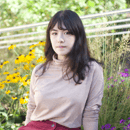For Shantala Thompson, her job doesn’t actually feel like one. As the new Program Manager for the University of Maryland’s LGBT Equity Center, she finds herself doing what she loves: interacting with students and creating a safe space for anyone regardless of race, sexuality, gender, or ability.
“When I work in environments like this, it doesn’t feel like work because I feel like it’s really my duty and my passion to really make queer folks feel good.”
Photo by Gabrielle Lewis
The LGBT Equity Center announced Thompson as their new Program Manager at the end of September, though she just joined the center’s staff during the last week of October.
Before coming to this university, Thompson worked as the Program Coordinator for the Center for Africana Studies at the University of Pennsylvania. Before that, she worked in a student involvement office at SUNY Albany where she advised a variety of clubs and assessed their programming.
Thompson also has another side to her career: working with children and volunteering. Thompson was the Director for Religious Education at a Unitarian church where she wrote social justice-centered curricula for kindergarten through 12th grade schools in Philadelphia. She also volunteered to do consulting work based on social justice education in the same city.
Thompson’s always been interested in the “intersections of race, gender, sexuality, ability” and how various identities merge together, and her background in both Africana studies and gender, women and sexuality studies reflects that. Although she previously worked in an Africana studies center and observed identities’ intersections there, LGBT studies is her first love. She wanted a profession where she’d be working within the LGBT community and exclusively working with students.
“When I went through the interview process [for becoming the Program Manager], I really liked what was said about intersectionality, and I really loved the work that was being done here,” Thompson said. “That made it a real easy decision to come.”
The LGBT Equity Center’s lounge where students can relax and chat. (Photo by Gabrielle Lewis)
Although her title is Program Manager, programming will have to wait as Thompson learns the ins and outs of her new job. So far, the position has entailed plenty of training and learning about the culture of this university. “In the midst of that, I am looking forward to doing some lowkey programming just to get to know more about the students, faculty and staff here at UMD,” she said.
Thompson’s vision for immediate programming starts small. She aims to start open office hours and create more walk-in events, like coffee or craft hours, to invite people of all LGBT identities, races, and ability to the center.
As for future initiatives and programs, Thompson wants to create events focused on specfic groups, such as the Black LGBT community, POC communities, and the transgender community. She also wants to create more events centered around ability and disability.
Thompson’s also looking into creating an advisory board where undergraduate students can voice what kinds of events they want to see. “My philosophy is that I definitely will make some decisions about programming, but I want it to be a discussion,” she said.
The LGBT Equity Center’s resource table by the entrance. (Photo by Gabrielle Lewis)
Thompson uses she/they pronouns and identifies as lesbian, and she uses lesbian and queer interchangeably. Although she knew about her queerness at a young age, she didn’t know how to articulate it until high school.
“That’s when I came out, and it wasn’t a positive experience,” she said. “I think because of my experiences coming out as a queer person, that really led me to be passionate about working within LGBT communities and having support that I didn’t have when I was younger.”
Part of why Thompson is so passionate about the intersection of identities is because as a Black, queer woman, everything she does is connected to her experiences through those identities, Thompson said.
“I think it [her experiences] allows me to really work in communities and understand the complexity of identities and be compassionate about the complexities of identities,” she said. When combined with her academic background in gender, women and sexuality studies, Thompson merges that knowledge with her personal experiences in her social justice work to create a more holistic experience for students.
The LGBT Equity Center at this university has a powerful sense of community, Thompson said, which she sees as a great sign of the center’s capabilities. Her focus on intersectionality will continue to expand the scope of the center’s community, pushing for a space where anyone can feel accepted.
“In order to serve anyone, you really have to think about intersectionality,” Thompson said. “I hope to create a space of acceptance and dialogue against differences, somewhere where no matter your race, economic status, [or] ability… students, staff and faculty will feel comfortable here and feel empowered here most importantly.”


